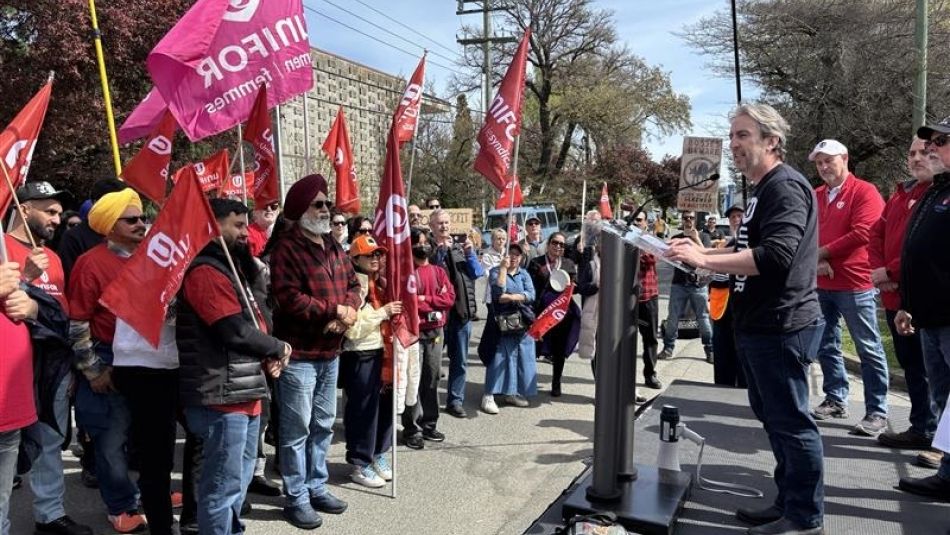
Share
Striking Transdev workers rallied outside BC Transit’s headquarters in Victoria on April 15 to send a strong message to the employer: access to washrooms (and reasonable break times to use them) is a fundamental human right.
Unifor members from Locals 114 and 333-BC went on strike on February 8 after Transdev refused to address providing dedicated washroom access to its bus drivers. Transit members, their locals, Unifor leadership and supporters attended the rally.
“Providing a safe and clean washroom is always the employer’s responsibility,” said Unifor National Secretary-Treasurer Len Poirier. “It is absolutely shameful that despite this, the strike is in the nine-week mark.”
“Transdev has continued to do nothing to address the lack of access to clean, safe washrooms to its bus drivers, and on top of that, not providing adequate break times to use them,” Poirier added.
The result is transit operators must walk a block or two to the nearest designated and often unavailable public washroom, whether in grocery stores, drug stores, gas stations or restaurants.
Operators only have a couple minutes to return to their busses to maintain their schedule. Route delays result in no opportunity whatsoever to break.
Unifor Western Regional Director Gavin McGarrigle placed the blame of the ongoing strike and the bigger picture of a broken transit system in British Columbia on the province, on BC Transit and on the municipality of Cowichan Valley Regional District, whose mayors were no-shows to the rally.
“[BC Transit] has failed the communities it has been created to serve, and it has failed the workers who provide the service that our citizens so badly need,” said McGarrigle. “Their track record is clear: four long strikes in three years affecting tens of thousands of residents. They have never apologized once. They have never shown any accountability.”
The B.C. provincial government promised to “review all private delivery models within BC Transit to make sure British Columbians are getting the best value for tax dollars and the best service for their needs.”
“That review is urgent and has not been announced to date since the new government was sworn in,” added McGarrigle. “It’s unfair that these transit workers should be so underpaid in wages and pension so that private contractors can make money and endure long transit strikes.”
At the rally, Local 114 bargaining committee member and transit operator Shaun Bhoondpaul spoke about the importance of solidarity in keeping the line strong, while another fellow transit operator, Michelle deVries, said occupied public washrooms mean late buses or bursting bladders.
Unifor returns to the table this week for a final round of mediation with Transdev, noted McGarrigle.
“They better have changed their tune substantially if there’s going to be a settlement,” he said.
“When we go back to the table, we’re not begging, we’re demanding dignity and the right to a break and decent washrooms. We’re insisting on address the growing gaps in transit worker wages disappearing to corporate profits.”
Each November, Unifor joins the International Transport Workers’ Federation to bring awareness to World Toilet Day to address the critical issue of sanitation and fight for safe and inclusive washroom facilities for all, particularly for transportation workers, women and 2SLGBTQI+ members.
This is a fight that is year-round and spans from coast-to-coast-to-coast, as the union has heard the same complaints from members across Canada working for a variety of transit authorities of not being able to access washrooms.
Unifor represents 21,000 members across the road transportation sector, including 7,600 transit operators and skilled trades staff working in urban transit.


